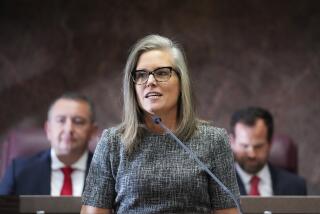Public Support for School ‘Voucher System’ Grows, Official Says
- Share via
U.S. Education Secretary William J. Bennett said Wednesday that the Reagan Administration is gaining vast grass-roots support for a controversial “voucher system” of allowing parents the option of sending their children to private instead of public schools.
Bennett, who appeared at the National Catholic Educational Assn. convention at the Anaheim Convention Center, told a press conference that the proposed voucher plan will “soon” be enacted into federal law despite initial signs of congressional resistance.
Congressional critics have charged that the voucher plan would undermine public education. Bennett and President Reagan have countered that overall education would benefit from the competition of allowing parents a choice about where their children are educated.
Bennett did not predict an exact time when he thinks the voucher system might pass. But he said people in the nation are indicating strong support, even though Congress has so far not been sympathetic to the proposal.
“We are winning the war, and probably losing the (congressional) battle for this year,” Bennett said.
Bennett said that favorable reaction to the voucher plan includes a poll that showed 65% of inner-city blacks advocating such an alternative-education system contrasted with only 29% opposed.
Bennett received a burst of applause from delegates to the convention when, in his formal speech, he noted that Catholic educators have been among the strongest supporters for a voucher system.
At a press conference, Bennett said: “Obviously the voucher system can be used at schools other than Catholic schools. Under our plan, vouchers can be used at public schools, private schools, parochial schools and the like.”
The Administration’s current proposal calls for launching the voucher system among 5 million disadvantaged students in the nation. Their parents would get vouchers averaging $600 a year for each school child. The parents could use the vouchers to send the child to either a public or private school.
Bennett said Catholic schools would draw many disadvantaged students under the plan because “Catholic schools have a good track record” with teaching inner-city poor students.
In his speech, Bennett repeatedly praised the work of Catholic schools in educating the urban poor. “Though most of their clientele are poor and many are not even Catholic, inner-city Catholic schools continue to provide their communities--our communities--with affordable, quality education,” he said.
He later added: “Not all Catholic schools are excellent; there are undoubtedly many that could improve. But by and large, Catholic schools are providing a good education to disadvantaged children.”
Bennett, who holds a doctorate in philosophy from Williams College in Massachusetts and a law degree from Harvard University, attended Catholic parochial schools in his elementary and high school years. He and President Reagan have been strong supporters of Catholic schools, and the controversial voucher plan stems from Reagan’s 1980 campaign pledge to try to help parents who send their children to such private schools.
One of the strongest critics of the voucher plan has been Rep. Augustus F. Hawkins (D-Los Angeles), chairman of the House Education and Labor Committee. It is that committee which has blocked action on the voucher proposal, but Bennett predicted Congress would “soon” be forced to pass such a bill by popular demand.
“Although there is something of a reactionary response from some people in the educational establishment, we will keep at it (pushing the voucher plan),” said Bennett. “Times are changing. America is changing. Children need more choices.”
In other comments at his press conference, Bennett said that television, by distracting students from reading, impairs education. He cited U. S. Department of Education studies that show children are watching more television and doing less reading.
Bennett also said television itself is not adequately fulfilling its potential as a medium to enhance learning. “Television, for the most part, has been harmful to education,” he said.
Nonetheless, Bennett said, he did not want to portray himself as anti-television. “I watch television,” he said. “I watch ‘Dallas’ . . . . And remember that the Japanese watch a lot of television, and they do pretty well in school.”
The four-day convention, which has drawn about 12,000 delegates, concludes today.
More to Read
Sign up for Essential California
The most important California stories and recommendations in your inbox every morning.
You may occasionally receive promotional content from the Los Angeles Times.













